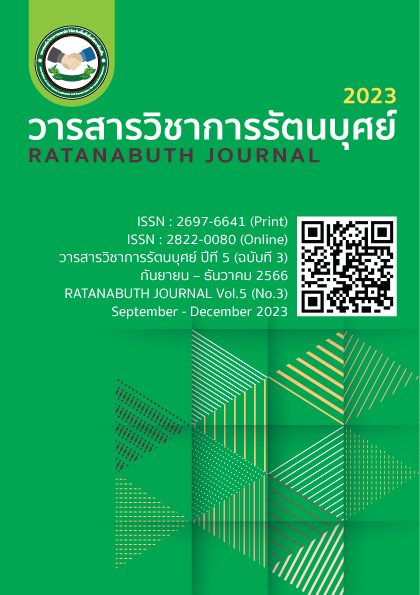รูปแบบการพัฒนาพฤติกรรมเชิงจริยธรรมสำหรับนักศึกษาระดับอุดมศึกษา Moral Behavioral Development Model for Higher Education Students
Main Article Content
บทคัดย่อ
การศึกษาพฤติกรรมทางจริยธรรมเป็นการทำความเข้าใจและทำนายพฤติกรรมทางศีลธรรมโดยอาศัยปัจจัยทางสุขภาพจิตใจ วิถีชีวิต พฤติกรรมทางสังคม บทความนี้มีวัตถุประสงค์เพื่อนำเสนอแนวทางการพัฒนาพฤติกรรมเชิงจริยธรรมสำหรับนักศึกษาระดับอุดมศึกษา ผู้เขียนใช้วิธีการศึกษาเอกสารทางวิชาการ จากนั้นทำการวิเคราะห์และสังเคราะห์พร้อมนำเสนอเชิงพรรณนาความ ผลการศึกษาพบว่า รูปแบบการพัฒนาพฤติกรรมเชิงจริยธรรมสำหรับนักศึกษา ประกอบด้วย (1) การให้ความรู้เกี่ยวกับหลักจริยธรรมแก่นักศึกษา (2) การเป็นแบบตัวอย่างพฤติกรรมเชิงจริยธรรมที่ดี (3) กำหนดจรรยาบรรณสำหรับนักศึกษา (4) ส่งเสริมการสนทนาอย่างเปิดเผย (5) การบูรณาการจริยธรรมในหลักสูตรการจัดการเรียนการสอน (6) การส่งเสริมความรับผิดชอบต่อตนเองและสังคม (7) การจัดเตรียมทรัพยากรและการสนับสนุนการพัฒนาพฤติกรรมเชิงจริยธรรม และ (8) การสรุปผล ประเมินผล และพัฒนาแนวทางการพัฒนาจริยธรรมสำหรับนักศึกษา
Article Details

อนุญาตภายใต้เงื่อนไข Creative Commons Attribution-NonCommercial-NoDerivatives 4.0 International License.
เอกสารอ้างอิง
Bairaktarova, D., & Woodcock, A. (2017). Engineering Student’s Ethical Awareness and Behavior: A New Motivational Model. Science and Engineering Ethics, 23(4):1129-1157. doi: 10.1007/S11948-016-9814-X
Bairaktarova, D., Woodcock, A. (2017). Engineering Student’s Ethical Awareness and Behavior: A New Motivational Model. Sci Eng Ethics. 23, 1129–1157. https://doi.org/10.1007/s11948-016-9814-x
Barnfield, A.M.C. (2017). "Did I Do Good?": The Teaching and Learning of Ethics. Collected Essays on Learning and Teaching, 10, 197-202. doi: 10.22329/CELT.V10I0.4752.
Bazerman, H.M., & Gino, F. (2012). Behavioral Ethics: Toward a Deeper Understanding of Moral Judgment and Dishonesty. Annual Review of Law and Social Science. 8 (1), 85-104.
https://doi.org/10.1146/annurev-lawsocsci-102811-173815
Butt, A., & Ashar, A. (2020). Role of behavioral sciences in the development of professionalism among MBBS students. J Fatima Jinnah Med Univ [Internet]. 14Mar.2020 [cited 17Aug.2023];14(1):3-. Available from: https://www.jfjmu.com/index.php/ojs/article/view/693
Cardi, J.W., Penfield, D.R., Yoon, A. (2012). Does Tort Law Deter Individuals? A Behavioral Science Study. Journal of Empirical Legal Studies (Blackwell Publishing Inc). 9 (3), 567-603, https://doi.org/10.1111/j.1740-1461.2012.01263.x
Cicero, F.R. (2021). Behavioral Ethics: Ethical Practice Is More Than Memorizing Compliance Codes. Behav Analysis Practice,14, 1169–1178. https://doi.org/10.1007/s40617-021-00585-5
Cicero, F.R. (2021). Behavioral Ethics: Ethical Practice Is More Than Memorizing Compliance Codes. Behav Analysis Practice, 14, 1169–1178 (2021). https://doi.org/10.1007/s40617-021-00585-5
Drumwright, M., et al. (2015). Behavioral Ethics and Teaching Ethical Decision Making. Decision Sciences Journal of Innovative Education (John Wiley and Sons Ltd). 13 (3), 431-458. https://doi.org/10.1111/dsji.12071
Drumwright, M.E., Prentice, R.A., & Biasucci, C. (2015). Behavioral Ethics and Teaching Ethical Decision Making. Decision Sciences Journal of Innovative Education, 13(3):431-458. doi: 10.1111/DSJI.12071
Furtak, A. (2022). Developing ethical research behavior in doctoral students. South African Journal of Bioethics and Law, 15(2), 65-68. doi: 10.7196/sajbl.2022.v15i2.813
González Gallo, I., Ramírez, D. A., Villarreal, C. S., & Parra Bolaños, N. (2020). Efectos de un programa basado en el Análisis Conductual Aplicado en la enseñanza de Conceptos Éticos y Morales religiosos. Revista Innovación Digital Y Desarrollo Sostenible - IDS, 1(1), 20 - 29. https://doi.org/10.47185/27113760.v1n1.4
Hamrah, N.A. (2017). Ethics in behavioral science research Understanding methodology experts' views. Medical Ethics Journal. 11 (41), 25-36.
Hildt, E., et al. (2019). Empowering Graduate Students to Address Ethics in Research Environments. Cambridge Quarterly of Healthcare Ethics, 28 (3), 542 - 550. DOI: https://doi.org/10.1017/S096318011900046X
Hogan, A.J. (2017). The Study of Behavior: Organization, Methods, and Principles. Cambridge University Press. https://doi.org/10.1017/CBO9781108123792
Ingram, D., & Derdak, T. (2018). The Ethics of Development: An Introduction. London: Routledge.
Keahey, J. (2020). Ethics for Development Research. Sociology of Development. 6(4), 395–416. https://doi.org/10.1525/sod.2020.6.4.395
Leonard, L.N.K., Riemenschneider, C.K. & Manly, T.S. (2017). Ethical Behavioral Intention in an Academic Setting: Models and Predictors. J Acad Ethics, 15, 141–166. https://doi.org/10.1007/s10805-017-9273-2
Marangos, J., Astroulakis, N., & Triarchi, E. (2021). The Advancement of Development Ethics. Panoeconomicus (Economists' Association of Vojvodina). 68 (4), 441-460. https://doi.org/10.2298/PAN180518003M
McCann, G. (2020). The ethics of global development. The Routledge Handbook to Rethinking Ethics in International Relations; Routledge.
Morahan, M., (2015). Ethics in management. IEEE Engineering Management Review, 43,(4), 23-25, Fourth Quarter 2015, doi: 10.1109/EMR.2015.7433683.
Mubako, G., Bagchi, K., Udo, G. & et al. (2021). Personal Values and Ethical Behavior in Accounting Students. J Bus Ethics, 174, 161–176 (2021). https://doi.org/10.1007/s10551-020-04606-1
Mubako, G., Bagchi, K., Udo, G.J., & Marinovic, M. (2021). Personal Values and Ethical Behavior in Accounting Students. Journal of Business Ethics, 174(1), 1-16. doi: 10.1007/S10551-020-04606-1
Murphy, J.M. (2020). Guiding Students in Assessing Ethical Behavior in the Pharmaceutical Industry. Teaching Ethics. 19 (1),71-85
Schiffer, M.B. (2013). Science: A Behavioral Perspective. In: The Archaeology of Science. Manuals in Archaeological Method, Theory and Technique, vol 9. Springer, Heidelberg. https://doi.org/10.1007/978-3-319-00077-0_2
Shen Xia, (2010). Study on behavioral science-based coalmine safety culture construction. IEEE International Conference on Emergency Management and Management Sciences, Beijing, China, 2010, pp. 406-409, doi: 10.1109/ICEMMS.2010.5563414.
Shokri, M. (2021). Predicting Moral Behavior based on Psychological Health, Lifestyle and Prosocial Behaviors. Int. J. Ethics Soc 2021, 3 (3), 28-35, URL: http://ijethics.com/article-1-135-en.html
Sonaiya, B.E. (2013). Academic integrity and ethics: issues, guidelines, and recommendations. Ife Journal of Agriculture. 26 (1), 131-140.
Song, T., Ustin, N.P., Popov, M.L., & Mudarisov, M.M. (2017). The Educational Technology of Ethical Development for Students. EURASIA J Math Sci Tech Ed, 13 (6), 2095-2110. https://doi.org/10.12973/eurasia.2017.01216a
Swanson, D. (2016). Fictional Stories with Ethical Content: Guidelines for Using Stories to Improve Ethical Behavior. Ethics & Behavior, 26:7, 545-561, DOI: 10.1080/10508422.2015.1081095
Treviño, L. K., Weaver, G. R., & Reynolds, S. J. (2006). Behavioral Ethics in Organizations: A Review. Journal of Management, 32(6), 951–990. https://doi.org/10.1177/0149206306294258
Vargas-Elizondo, C. (2020). On the Role of Ethics in Shaping Technology Development. HighTech and Innovation Journal. 1 (2), 86-100. DOI: 10.28991/HIJ-2020-01-02-05
Winston, B.E. (2019). Ethical Behavior from the Old Testament. In: Biblical Principles of Being an Employee in Contemporary Organizations. Christian Faith Perspectives in Leadership and Business. Palgrave Macmillan, Cham. https://doi.org/10.1007/978-3-030-11169-4_3
Zameni, F. (2017). Correlation between Development of Ethical Behavior and its Consequences in Workplace Environment, and Organizational Health. Health Law Journal. 1 (3), 31-34.


